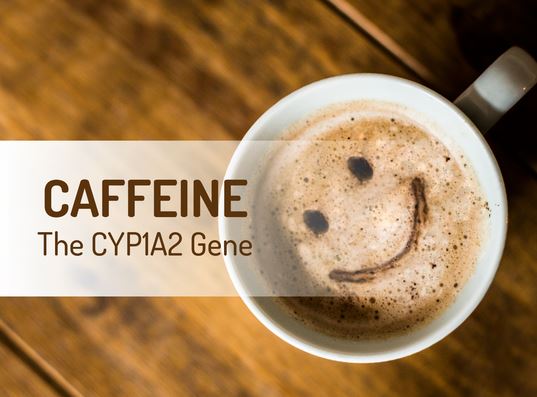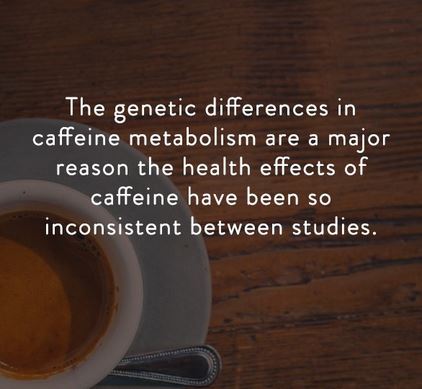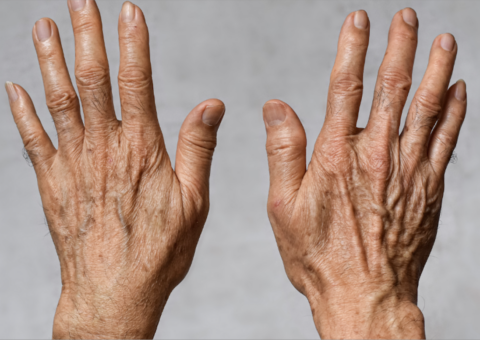
Did you know that your wake-me-up cuppa this morning contained over 1000 different compounds?
Coffee’s compounds are actually bioactive, meaning they can potentiate health benefits. Coffee’s constituents – various minerals, polyphenols, diterpenes, melanoidins – actually have anti-inflammatory, anti-oxidant and insulin-sensitizing properties.
![]() So another round of cortados FOR EVERYONE, then?
So another round of cortados FOR EVERYONE, then?
No, not so fast! We haven’t discussed YOU and your cup of coffee in its entirety yet. Your coffee also contains caffeine. Caffeine seems to a be a double-edged sword that ultimately determines coffee’s effects on the body: promoting alertness, productivity and mood enhancement in some; while causing anxiety, insomnia, digestive issues and hormone imbalances in others. Why is this?

Meet CYP1A2, the caffeine gene. This is the gene which determines how caffeine impacts you.
The caffeine that you ingest passes through your stomach and small intestine, entering the bloodstream in as little as 15 minutes, reaching its peak within 60 minutes! The rate at which the blood caffeine levels decline is controlled by CYP1A2.
Slow-metabolizers of caffeine experience its negative side-effects as caffeine builds up in the blood stream. Evidence suggests that higher amounts of caffeine intake in these individuals can increase risk of nonfatal heart attacks and/or high blood pressure. Whereas, fast-metabolizers can process caffeine more rapidly, and as a result, can consume caffeine without health concerns.

Remember, the body is a complex, interdependent organism. Along with genetics, several other factors can influence your response to caffeine, such as: baseline dietary habits, medication prescription, physical activity level, smoking habits, sleep regime, gut health and stress levels.
![]() Ok, so if I’m a ‘slow-metabolizer’, should I be drinking decaf beverages?
Ok, so if I’m a ‘slow-metabolizer’, should I be drinking decaf beverages?
For most slow-metabolizers, it’s not necessary to completely eliminate all caffeinated coffee; however, it is advised to consider amount and timing of caffeine intake carefully.
If selecting decaf versions of your favorite coffee, proceed with caution. Many companies use harsh chemicals to remove caffeine. In this case, select organic options or choose companies that are transparent about the processes used.
![]() What else should I consider before reaching for a cuppa?
What else should I consider before reaching for a cuppa?
HORMONES. CONSIDER HORMONES.
It’s true – your daily coffee habits could be disrupting your hormonal cascade. Here are 3 ways how:
- Caffeine can cause your body to create more of your ‘stress hormone’. If you’re anxious (tired or wired) and your cortisol levels are already elevated, then a further increase in cortisol can negatively affect your body’s ability to regulate inflammation.
- If you’re adding sugar, sweeteners, tons of dairy or even dairy milk alternatives (containing nasty additives; such as inflammatory oils, thickeners or stabilizers) to make your brew more palatable, then it’s highly likely that you’re increasing your blood sugar. High blood sugar means higher insulin levels, which means more inflammation.
- We know that sleep is essential for healthy hormone production. Believe it or not, but caffeine can stay in your system for up to 24 hours; so if you’re drinking it in the morning, then it may still be compromising a good night’s rest.
A bad sleeper + a slow-caffeine metabolizer + high stress = hormone imbalances, which (you’ve guessed right) feeds into the inflammatory cycle!
![]() 5 TIPS for caffeine addicts:
5 TIPS for caffeine addicts: ![]()
- Lose the sugar, artificial sweetener and creamer!
- Get your cortisol levels assessed by your health care practitioner. If your adrenals are struggling, avoid drinking coffee on an empty stomach.
- Chat to your nutritionist about adrenal-supportive nutrients – such as Bs, Vitamin C, magnesium and some apoptogenic herbs.
- Swap out some cups of coffee later in the day for herbal teas – especially teas like holy basil or chamomile which will assist with cortisol reduction.
- If you’re wanting to reduce your coffee intake – wean off by 50% every week (ideally on weekend days so that you’ve got time to take it slow when the withdrawal symptoms hit!).
![]() So, is coffee bad?
So, is coffee bad?

The answer is yes and no.
COFFEE IS COMPLEX.
YOU ARE COMPLEX.
Check your genes, consider your current health concerns, or ask your nutritionist at TASH 360. We’re here for you.








